4.0 Lession 4 透视投影
[TOC]
ViewPort
我们之前将顶点坐标[-1,1]映射到[0,width][0,height]时使用的是
Vec3i ((v.x + 1.) /2. * image.get_width(), (v.y + 1.) /2. * image.get_height(), (v.z+1.)*depth/2.);
这种可以通过Matrix实现
Vec3f v = model.vert(face, j);
uv[j] = model.uv(face, j);
Vec3f tmp = m2v(viewportMatrix * v);
screenCordinates[j] = Vec3i (tmp[0], tmp[1], tmp[2]);
Matrix viewportMatrix = viewPort(width / 2, height / 2, width, height, depth);
Matrix viewPort(int startx, int starty, int endx, int endy, int depth){
Matrix matrix = Matrix::identity(4);
int width = endx - startx;
int height = endy - starty;
//-1 ~ 1 映射到 startx, starty, endx, endy,以x为例,相当于 先+1,×width然后除2,再平移startx的距离
matrix[0][0] = (float)width/2;
matrix[0][3] = (float)(width + 2*startx) / 2.f;
matrix[1][1] = (float)height/2;
matrix[1][3] = (float)(height + 2*starty) / 2.f;
matrix[2][2] = (float)depth/2;
matrix[2][3] = (float)depth/2;
return matrix;
}
Vec3f m2v(Matrix matrix) {
return Vec3f(matrix[0][0]/matrix[3][0], matrix[1][0]/matrix[3][0], matrix[1][0]/matrix[3][0]);
}
感兴趣可以尝试导一下,一样的道理。
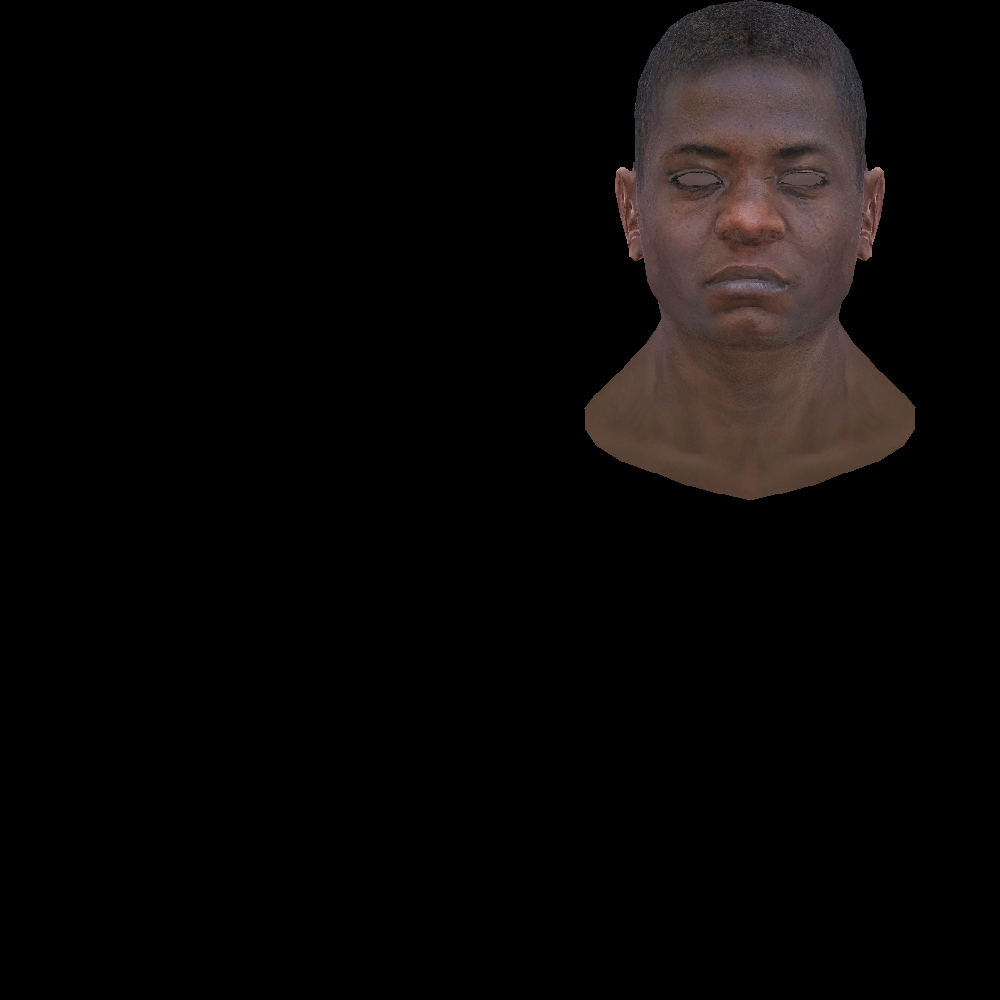
投影
正交投影
我的理解:其实ViewPort实际上是一个正交投影
正交投影是一种比较简单的投影,所有的投影线都与最终的绘图表面垂直。直接将坐标映射到屏幕的二维平面内,但实际上一个直接的投影矩阵将会产生不真实的结果。
正交投影矩阵
3d
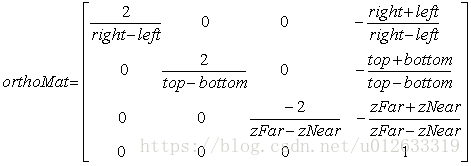
2d

透视投影
正交投影得到的结果是无法区分物体远近的,因为所有的投影线都是垂直的,透视投影带有远近的效果,更真实。
一个平截头体可以有近平面、远平面、裁剪面的宽高比、fov(纵向视角大小)构成。物体在平截头体内投影到近平面上,看到一篇文章一句话很好
透视投影矩阵的任务就是把位于视锥体内的物体的顶点X,Y,Z坐标映射到[-1,1]范围。这就相当于把这个四棱台扭曲变形成一个立方体。
这就很好理解为什么近平面的物体看起来更大。
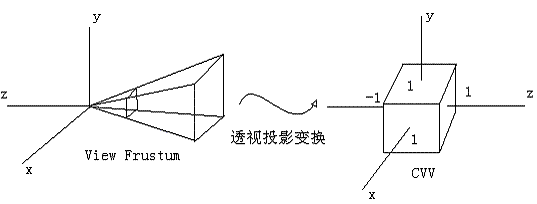
推导
有一点P,位于视锥体内,设坐标为(x,y,z).分别对x,y坐标和z坐标的变换到[-1,1]:
- 设近裁剪面的宽度为W,高度为H,P’点的x坐标范围是[-W/2,W/2],y坐标范围是[-H/2,H/2],然后分别线性映射至[-1,1]内即可。
- z坐标的范围是N至F,需要映射到[-1,1]
参数:
- Fov:纵向的视角大小
- aspect:裁剪面的宽高比
- zNear:近裁剪面离摄像机的距离,图中的n
- zFar:远裁剪面离摄像机的距离,图中的f
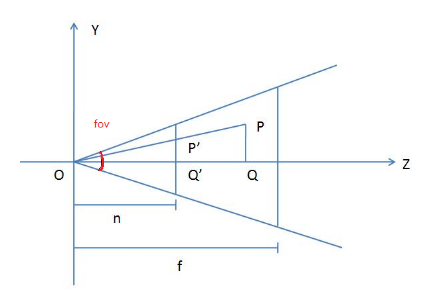
求得点P在近裁剪面的投影点P’的坐标
根据相似三角形对应边长度的比率相同,由图可得
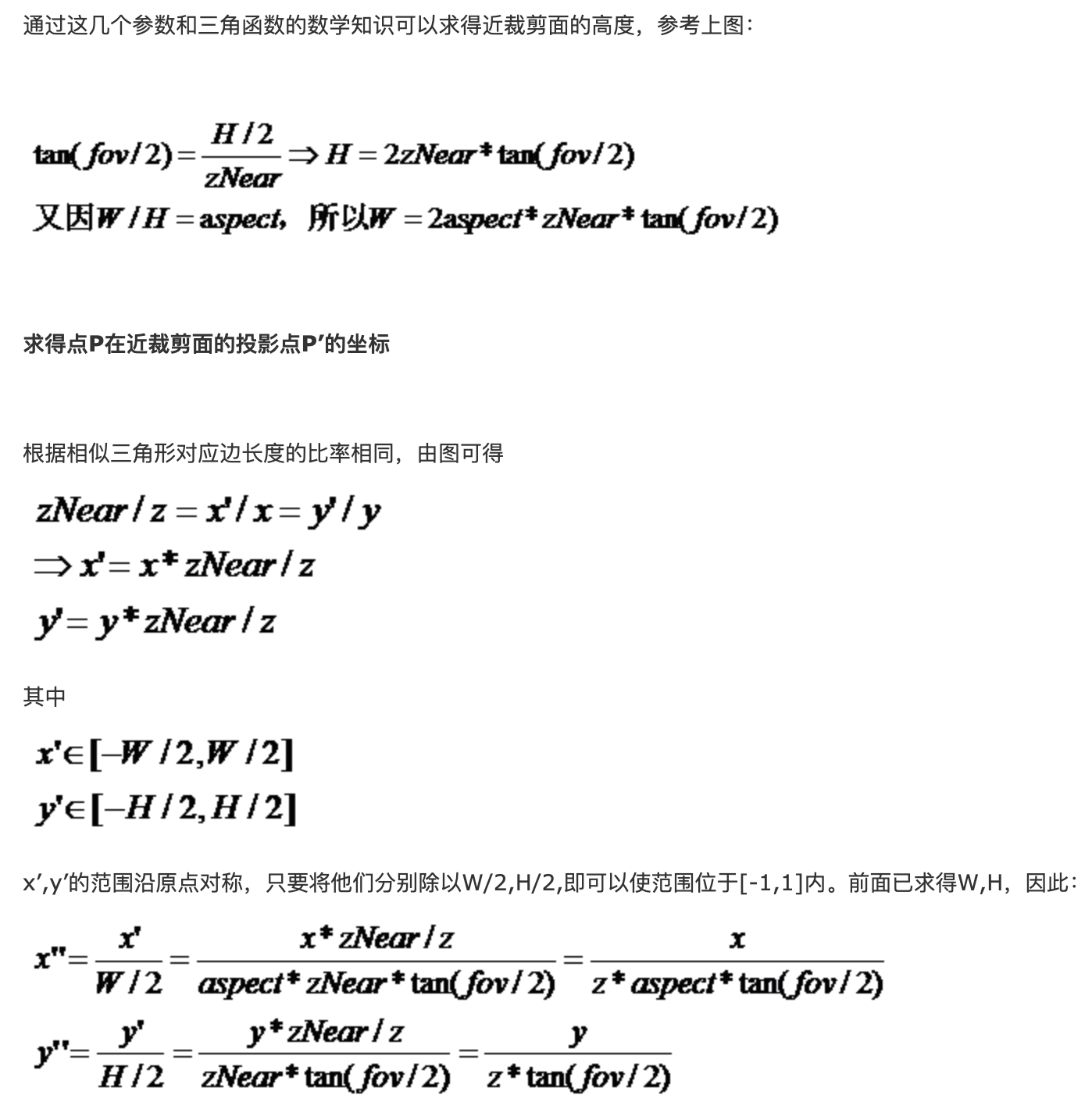
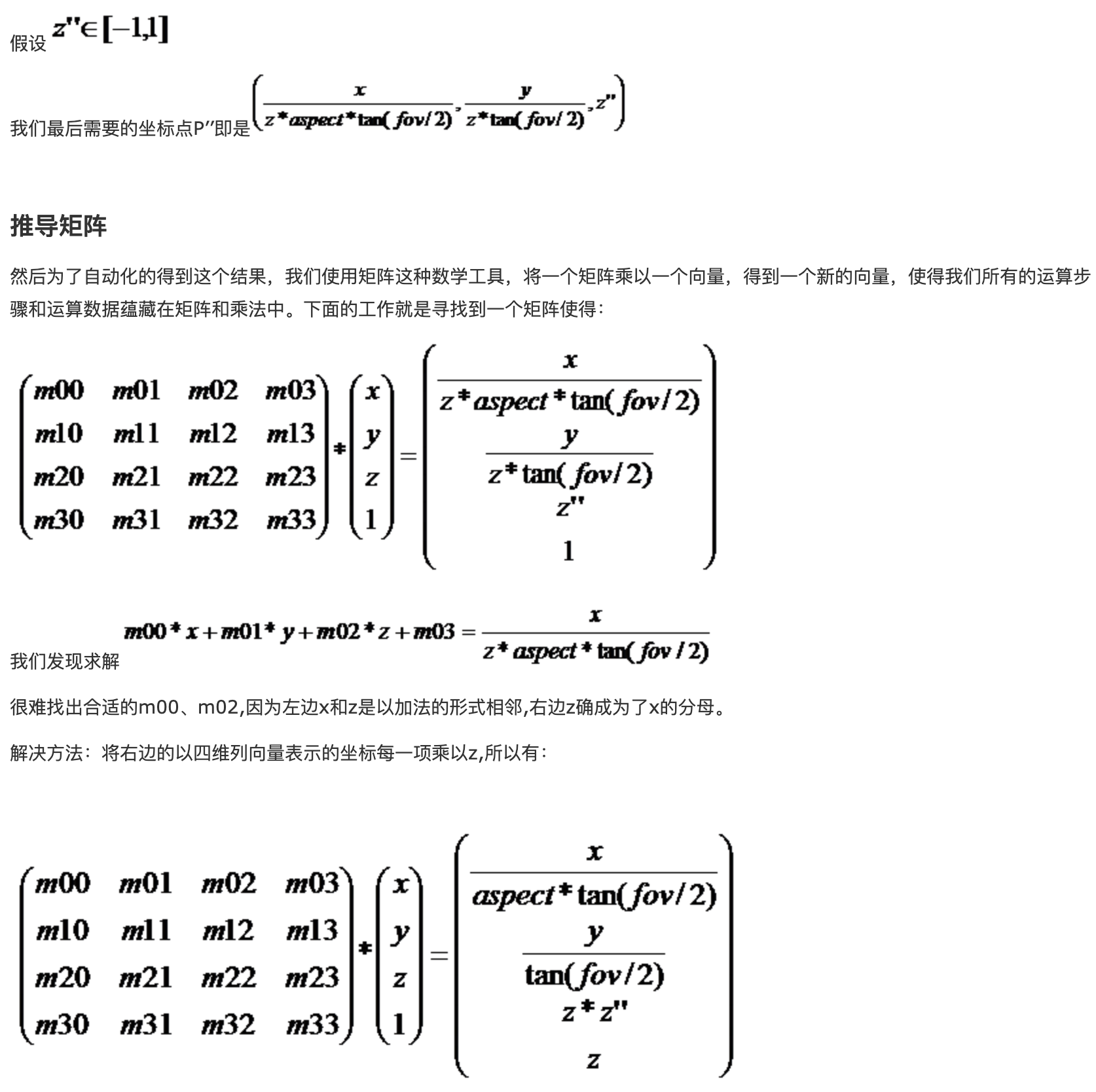
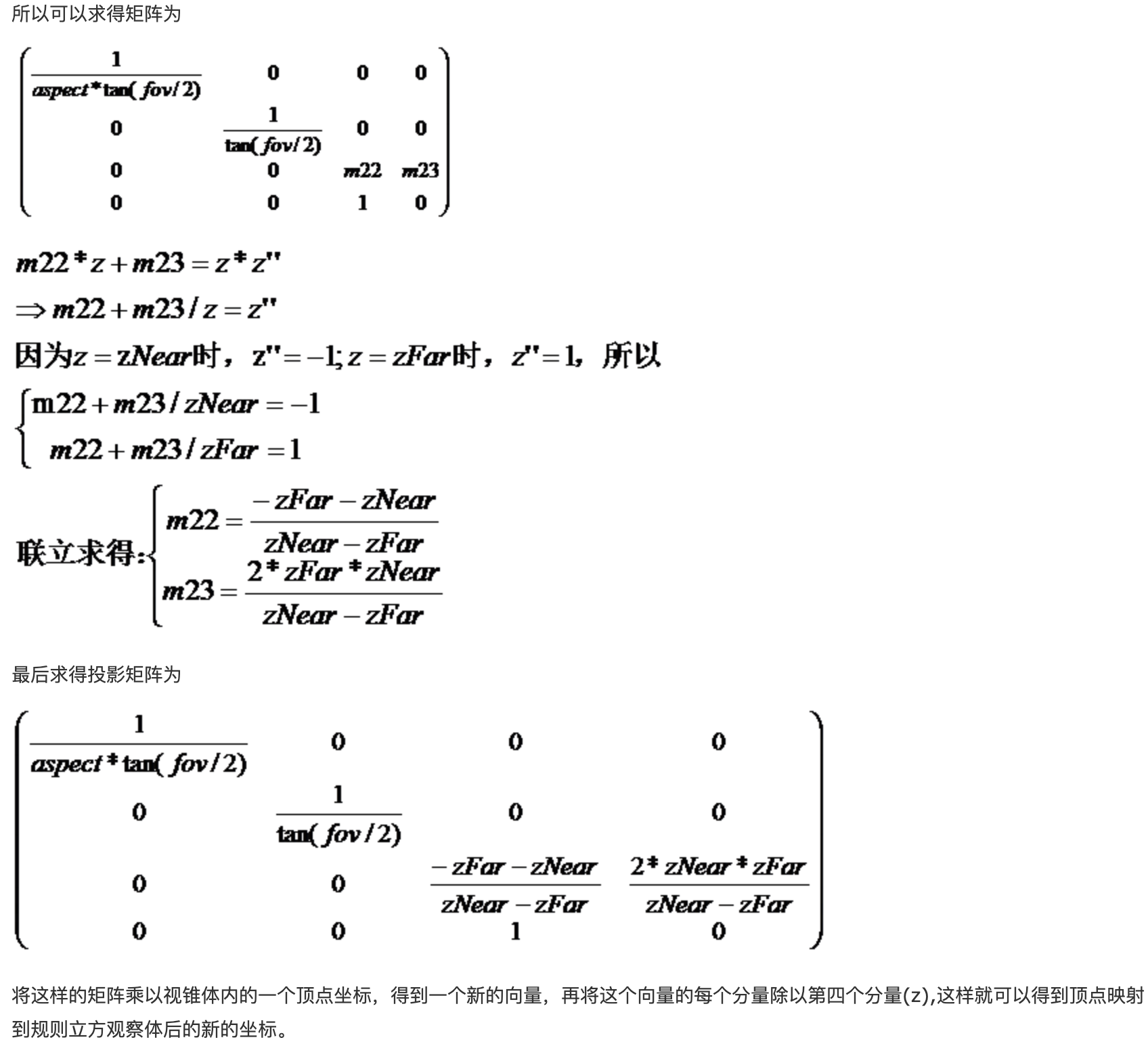
上图[2,2]的分子写反了。
假设如果设定近平面的顶边的Y值为t,上述的矩阵可以变化为
aspect = w/h;
tan(fov/2)=t/n
那么[0][0]变成 h*n /(w*t), h/t =2
所以
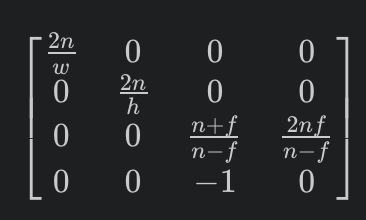
透视投影矩阵
Matrix Matrix::initPersProjMatrix(float FOV, const float aspect, float zNear, float zFar) {
Matrix matrix(4, 4);
const float zRange = zNear - zFar;
const float tanHalfFOV = std::tan(toRadian(FOV / 2.0f));
matrix[0][0] = 1.0f / (tanHalfFOV * aspect);
matrix[1][1] = 1.0f / tanHalfFOV;
matrix[2][2] = (-zNear - zFar) / zRange;
matrix[2][3] = 2.0f * zFar * zNear / zRange;
matrix[3][2] = 1.f;
return matrix;
}
透视除法
示例
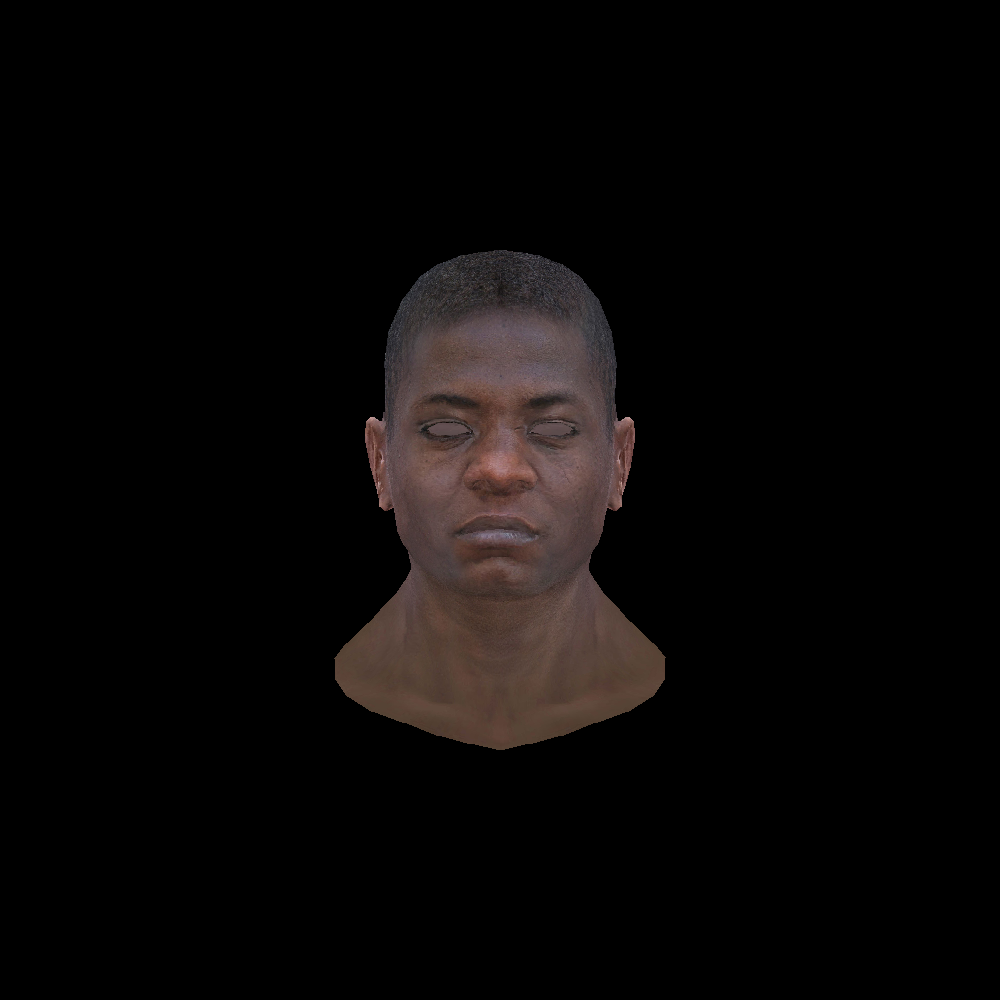
Matrix projectMatrix = Matrix::initPersProjMatrix(30, 1, 3, -3);
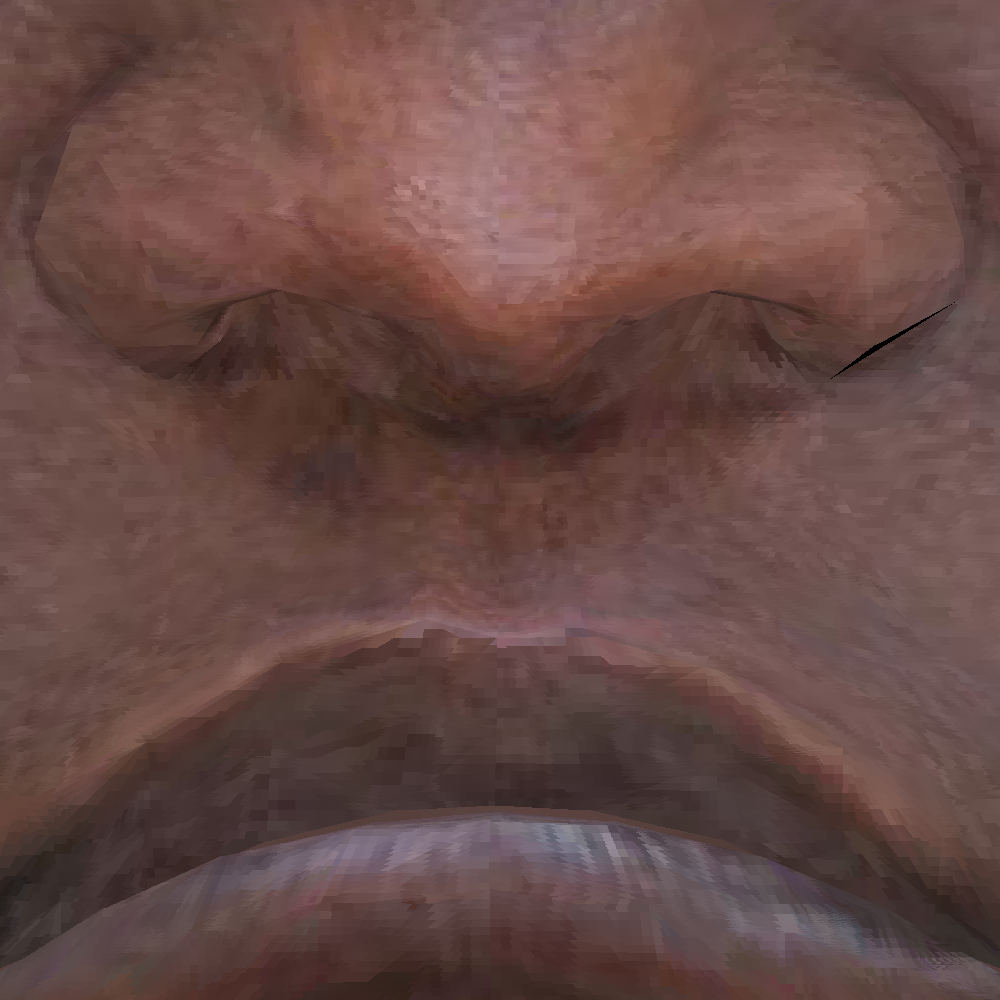
int width = 1000;
int height = 1000;
int depth = 255;
TGAImage image(width, height, TGAImage::RGB);
Model model("../obj/african_head.obj");
Vec3f lightDir(0, 0, -1);
Matrix viewportMatrix = viewPort(width / 4, height / 4, width * 3.f / 4, height* 3.f / 4, depth);
Matrix projectMatrix = Matrix::initPersProjMatrix(30, 1, 3, -3);
int* zbuffer = new int[width*height];
for (int i = 0; i < width * height; i++) {
zbuffer[i] = std::numeric_limits<int>::min();
}
for (int face = 0; face < model.nfaces(); face++) {
Vec3i screenCordinates[3];
Vec3f worldCordinates[3];
Vec2i uv[3];
for (int j = 0; j < 3; j++) {
Vec3f v = model.vert(face, j);
worldCordinates[j] = v;
}
Vec3f norm = (worldCordinates[2] - worldCordinates[0]) ^(worldCordinates[1] - worldCordinates[0]);
norm.normalize();
float intensity = norm.dotProduct(lightDir);
if (intensity <= 0) {
continue;
}
for (int j = 0; j < 3; j++) {
Vec3f v = model.vert(face, j);
uv[j] = model.uv(face, j);
std::cout<<v;
Matrix tmp = projectMatrix * v;
//透视除法
tmp[0][0] /= tmp[3][0];
tmp[1][0] /= tmp[3][0];
tmp[2][0] /= tmp[3][0];
Vec3f tmp2 = m2v(viewportMatrix * tmp);
screenCordinates[j] = Vec3i (tmp2[0], tmp2[1], tmp2[2]);
}
if (intensity > 0) {
triangle_line_sweeping_texture_3d(screenCordinates[0], screenCordinates[1], screenCordinates[2], uv[0],
uv[1], uv[2], &model, intensity, image, zbuffer);
}
}
image.flip_vertically();
image.write_tga_file("l4_5_viewport_perspective_project.tga");
平移
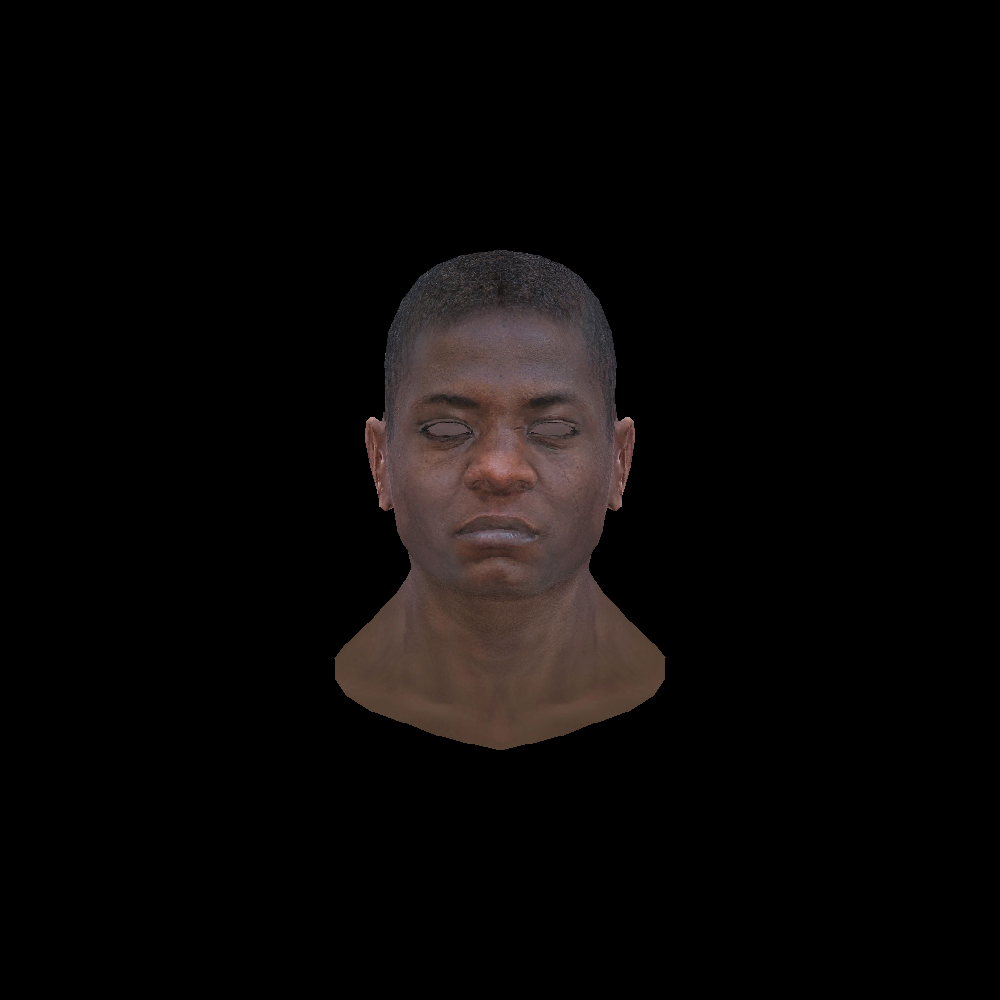
int width = 1000;
int height = 1000;
int depth = 255;
TGAImage image(width, height, TGAImage::RGB);
Model model("../obj/african_head.obj");
Vec3f lightDir(0, 0, -1);
Vec3f camera(0, 0, 3);
Matrix viewportMatrix = viewPort(width / 2, height / 2, width, height, depth);
Matrix projectMatrix = Matrix::initPersProjMatrix(90, 1, 100, 1000);
//注意这里的平移矩阵
Matrix tansMatrix = Matrix::identity(4);
tansMatrix[0][3] = - width / 4;
tansMatrix[1][3] = - height / 4 ;
int* zbuffer = new int[width*height];
for (int i = 0; i < width * height; i++) {
zbuffer[i] = std::numeric_limits<int>::min();
}
for (int face = 0; face < model.nfaces(); face++) {
Vec3i screenCordinates[3];
Vec3f worldCordinates[3];
Vec2i uv[3];
for (int j = 0; j < 3; j++) {
Vec3f v = model.vert(face, j);
uv[j] = model.uv(face, j);
//注意顺序
Vec3f tmp = m2v(tansMatrix * viewportMatrix * v);
screenCordinates[j] = Vec3i (tmp[0], tmp[1], tmp[2]);
worldCordinates[j] = v;
}
Vec3f norm = (worldCordinates[2] - worldCordinates[0]) ^(worldCordinates[1] - worldCordinates[0]);
norm.normalize();
float intensity = norm.dotProduct(lightDir);
if (intensity > 0) {
triangle_line_sweeping_texture_3d(screenCordinates[0], screenCordinates[1], screenCordinates[2], uv[0],
uv[1], uv[2], &model, intensity, image, zbuffer);
}
}
image.flip_vertically();
image.write_tga_file("l4_5_viewport_translate.tga");